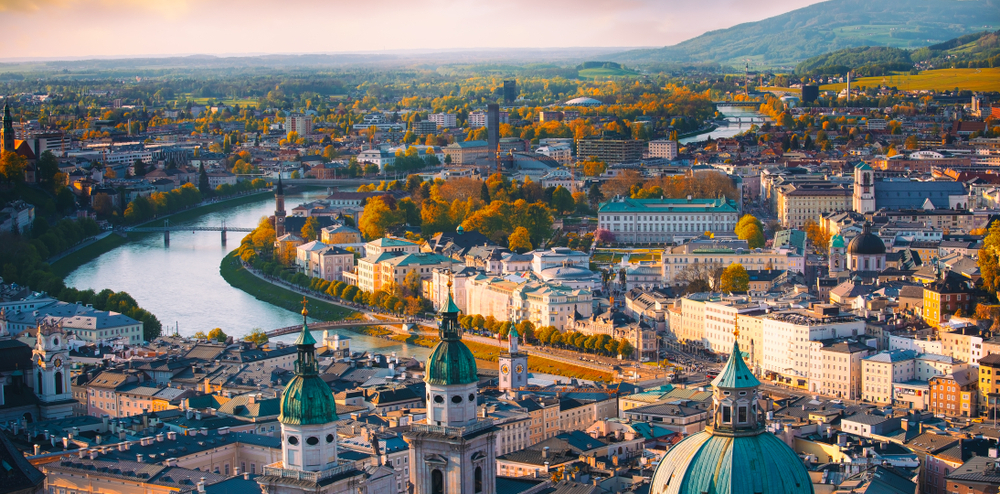
Living and Working in Austria
Austria is based in the southern part of central Europe and is made up of nine federated states, with the capital being Vienna. The European country is well known for its castles, palaces, and buildings, among other architectural structures. Vienna has a unique cultural charm and history, being a port on one of Europe’s most important rivers. It’s a bustling city filled with cosy wine taverns and coffee houses.
Living & Working in Austria
What languages do they speak in Austria?
The official language of Austria is German although other languages commonly spoken in the country are Croatian, Hungarian, Turkish and Slovenian. English is known to be widely spoken in business environments, but German is the preferred language.
What are the legal requirements for moving to Austria?
EU Nationals do not require a visa upon entering Austria, although other nationals will need to apply for a visa in order to enter. A residence permit is required for any foreign nationals who wish to stay in Austria for more than 6 months. If you are planning to work in Austria, or you’re being transferred there by your company, you will need to acquire one.
This can be either a restricted work permit (which only lasts for a year) or a work permit, which lasts for two years. There is also an option for an unrestricted work permit that lasts up to five years, so depending on how long you desire to stay will determine which one you choose.
How long do you have to live in Austria before becoming a resident?
To seek permanent residency in Austria, you need to live there first for at least six months. Third-country nationals who intend to stay in Austria for more than six months also require a residence permit.
How do I open a bank account in Austria?
To open a bank account in Austria you need the following documents or identification:
- Proof of identity (such as a passport)
- Proof of residency (usually a Residency Registration form and utility bills)
- Proof of employment
If you want to open a bank account online in Austria, as a non-resident, you can set up an online-only bank account. Raiffeisenlandesbank NÖ-Wien bank, for example, allows you to sign up for an account online. This means you do not have to visit the bank in person.
Does Austria provide healthcare?
Austria has a great two-tier health care system (considered one of the best in the world) in which all individuals receive publicly funded care if they fall unwell. People do also have the option to purchase supplementary private health insurance. Some individuals choose to pay for their care privately altogether.
How do you buy a property in Austria?
In order to officially purchase a property in Austria, there are two steps. One is the buying contract, called “Titel”. The second part is the entry into the land register which is known as “Modus”. This second part is also the point when payment for the property is usually due.
Can I drive in Austria with a US license?
When driving in Austria, it is only legal to drive with a US licence for the first six months. After this, all drivers must obtain an Austrian licence.
How much does it cost to live in Austria?
On average, it costs around €735 to rent a one-bedroom apartment in a city centre, excluding bills. A one-bedroom apartment outside the city centre would cost on average €580 a month. The average monthly net salary in Austria is €2,000.
How expensive is education?
Public universities are cheaper than private universities in Austria. A lot of the time, public universities are free to attend for students from other European Union countries, although, students from non-EU countries will be expected to pay fees. Having said this, attendants must pay approximately €18 per semester in student union and student insurance fees.
For non-EU/EEA students, it is a bit different. Tuitions are on average €1,452 for each academic year. All students must pay the student union membership and students accident insurance fees, which also cost around €20 each semester. International students from developing countries are exempt from tuition fees at many public Austrian universities.

Working in Austria
What are the usual working hours in Austria?
A normal working week in Austria is 8 hours per day, totalling 40 hours a week. Office hours tend to be between 8am and 6pm, and shops can be open from around 6am until 7.30pm.
How much annual leave are you entitled to?
Austrian employees are entitled to 25 days’ paid holiday, rising to 30 days after 25 years’ service. As well as this, there are 13 paid public holidays each year.
What benefits are you entitled to?
In Austria, employers should pay employees their holiday pay before their holiday starts. Other mandatory benefits employees in Austria are entitled to are social security, severance pay, termination notice and pension fraud.
Pregnant employees in Austria have maternity benefits and will receive eight weeks off before their baby’s due date, and eight weeks after.
Do I need a visa to work in Austria?
EU/EEA citizens are free to work as they please in Austria and do not need any permits at all for the first three months. Just like with residency, if you are planning to stay longer than 90 days, then you must apply for a certificate of registration in order to continue your stay or face a €200 fine.
How should I conduct myself in a business meeting?
In Austria, punctuality is the most important thing, especially in business meetings and interviews. It’s essential you arrive at least 5 minutes if not 10 minutes early to any meetings you have.
What taxes are there?
All residents in Austria are taxed on their income, including income from trade or business, profession, employment, investments, and property. Non-residents are subject to income tax on Austrian-source income at normal rates. Income tax is between 0% (for those earning less than €11,000) and 50%, for those earning anything above €90,000.
The Do’s
Do…
- Observe to avoid misunderstandings
- Maintain eye contact
- Shake hands with everyone individually
- Wear conservative business suits and don’t remove your jacket or tie before your seniors do
The Don’ts
Don’t…
- Arrive poorly dressed
- Arrive late
- Address people incorrectly
- Sit down until invited to sit down – you may be shown to a seat

Considering Business Expansion into Austria?
IRIS FMP are international payroll and HR experts. We know how to help you achieve compliance with all local employment law in Austria. See our guide to HR and payroll in Austria.